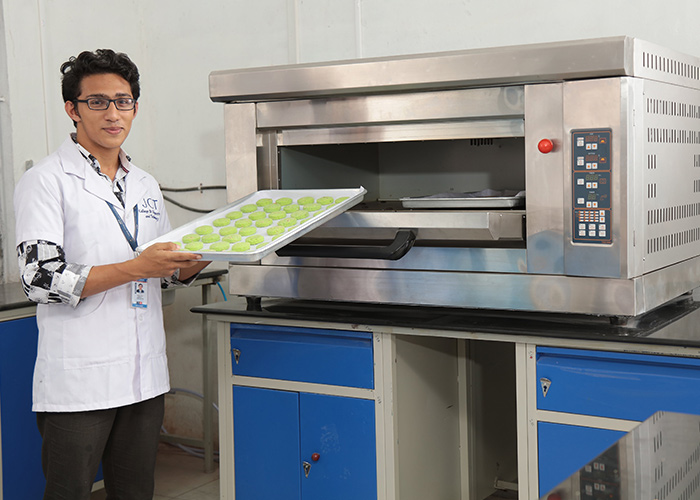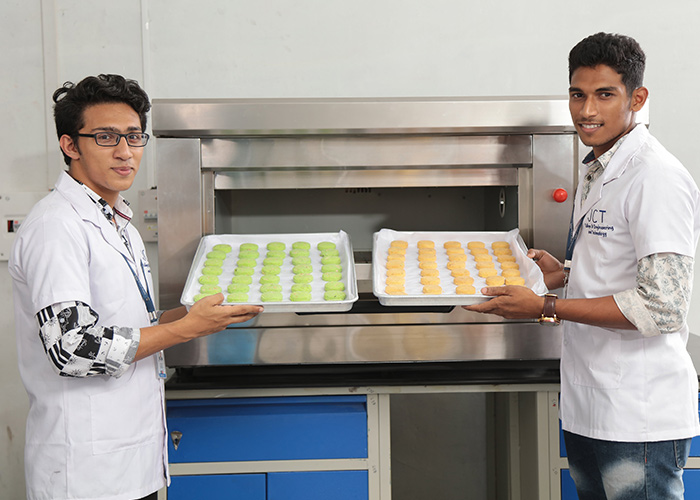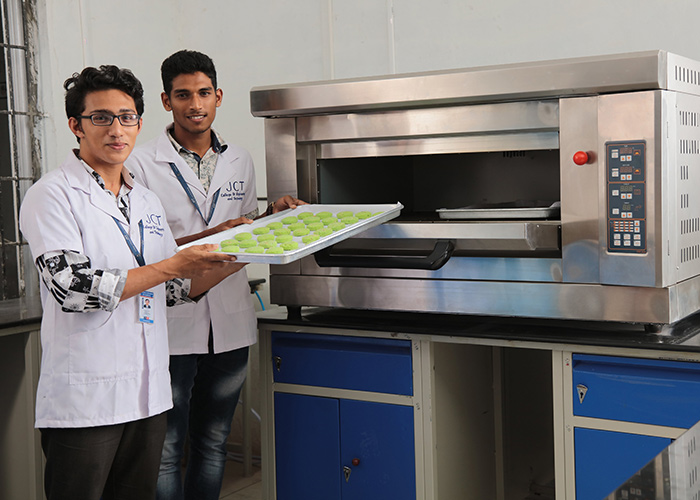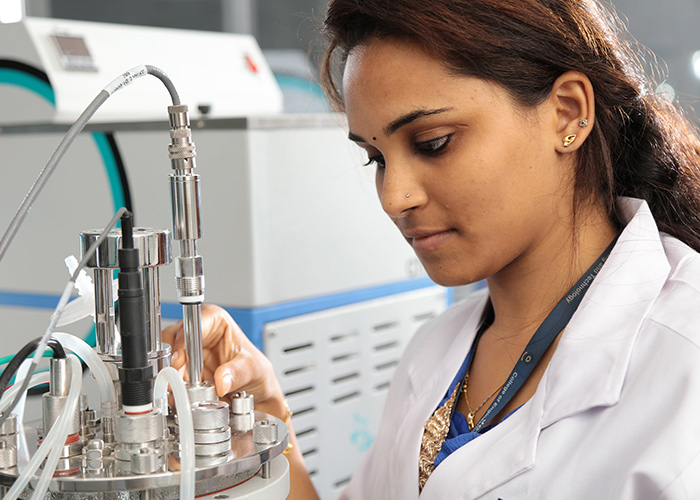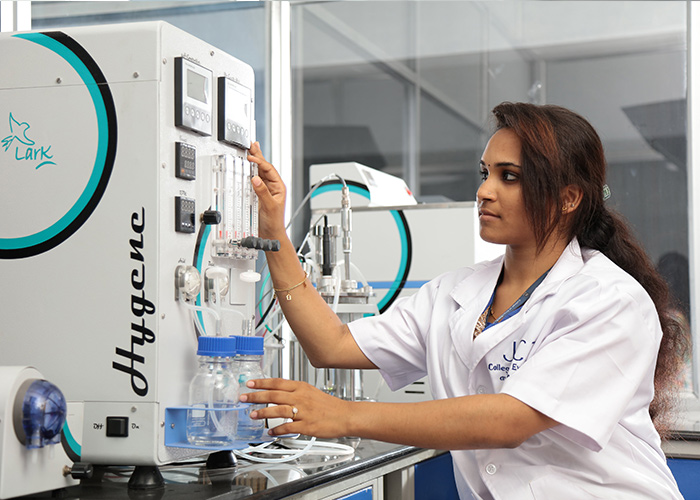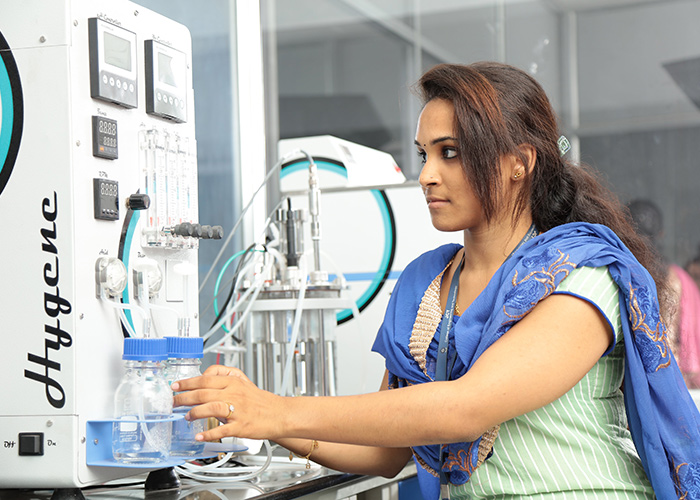X
What are your looking for ?
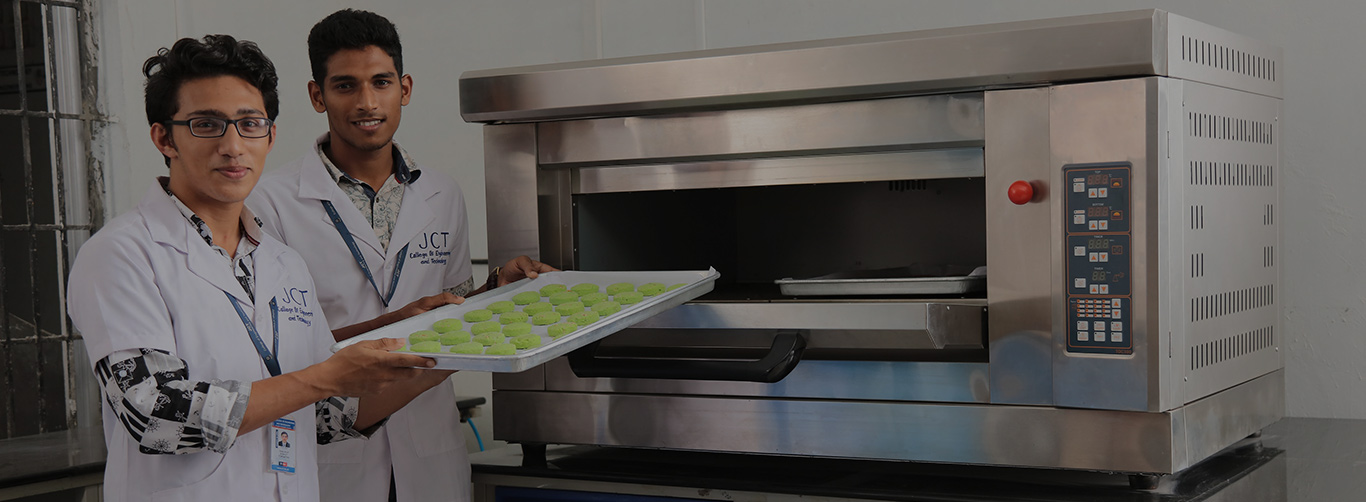
Food Technology
Explore Admission- About The Department
- Vision and Mission
- PEOs, POs, PSOs and Course Outcomes
- Department Advisory Committee
- Laboratory Facilities
- Credentials
- Department Events
About The Department
The main objective of the food technology department is to create trained and skilled human resources to cater to the needs of the rapidly growing food processing sector. The department is also intended to provide technical support to farmers and entrepreneurs to establish small scale industries. Food Science and Technology is a multidisciplinary course which includes subjects on processing, preservation, chemistry, quality, safety and marketing aspects of food and food products. The curriculum has been framed in such a manner that by the time the student completes this degree program, the entrepreneur skill is already developed and they are fit to work in research, teaching and industry. The department is well equipped with new equipped laboratories with internet and WI-FI connectivity.
Job Opportunities
Graduates in Food Technology or Those who have done food processing courses have vast scope in food processing industries, research laboratories, hotels, soft drink factories, quality control, rice mills, manufacturing industries, and distilleries. Public sector undertakings like Food Corporation of India require people to handle purchase, storage, transportation, and distribution of food grains and other processed food items.
Scope
Food processing industry is rapidly growing in India and several employment opportunities are available in various industries. There is good scope of food technology courses which offer numerous job opportunities in various areas. In India food processing industry is gaining momentum as the consumer food industry, which includes pasta, breads, cakes, pastries, corn flakes, ready to eat and ready to cook products, cocoa products, biscuits, soft drinks, beer, alcohol beverages, mineral and packaged water and segment of consumer foods is seeing an upward trend.
Vision
To provide a platform for overall development of the students, to be more creative, innovative, ethical and globally competent food technocrats.
Mission
- To inculcate in-depth knowledge of Food Technology with an ability to analyze, evaluate, design and integrate existing and new knowledge.
- Imparting knowledge & technical skills for better processing and value addition of food & agro-products.
- Creating a multi-disciplinary platform capable of conducting research, technology development, solving industrial and social challenges on top of classroom teaching.
- To educate our students by teaching them leadership, entrepreneurship, teamwork, values, quality and ethics.
Programme Educational Objectives (PEOs)
After 4 years of graduation, the Food Technology graduates will:
- PEO1 - Graduates will have successful career in food and allied industries at various levels of management.
- PEO2 - Graduates will have the core technical skills and knowledge that will empower them to pursue lifelong learning and research.
- PEO3 - Graduates will deliver innovative solutions and services to address industrial and societal challenges, upholding ethical principles and social responsibility.
Programme Outcomes
Engineering Graduates will be able to:
- PO1 – Engineering Knowledge - Apply the knowledge of mathematics, science, engineering fundamentals and an engineering specialization to the solution of complex engineering problems.
- PO2 - Problem analysis - Identify, formulate, review research literature, and analyze complex engineering problems reaching substantiated conclusions using first principles of mathematics, natural sciences, and engineering sciences.
- PO3 - Design/development of solutions – Design solutions for complex engineering problems and design system components or processes that meet the specified needs with appropriate consideration for the public health and safety, and the cultural, societal, and environmental considerations.
- PO4 - Conduct investigations of complex problems - Use research-based knowledge and research methods including design of experiments, analysis and interpretation of data, and synthesis of the information to provide valid conclusions.
- PO5 –Modern tool usage–Create, select, and apply appropriate techniques, resources, and modern engineering and IT tools including prediction and modelling to complex engineering activities with an understanding of the limitations.
- PO6 - The engineer and society–Apply reasoning informed by the contextual knowledge to assess societal, health, safety, legal and cultural issues and the consequent responsibilities relevant to the professional engineering practice.
- PO7 - Environment and sustainability –Understand the impact of the professional engineering solutions in societal and environmental contexts, and demonstrate the knowledge of, and need for sustainable development.
- PO8 –Ethics –Apply ethical principles and commit to professional ethics and responsibilities and norms of the engineering practice.
- PO9 –Individual and team work –Function effectively as an individual, and as a member or leader in diverse teams, and in multidisciplinary settings.
- PO10 –Communication –Communicate effectively on complex engineering activities with the engineering community and with society at large, such as, being able to comprehend and write effective reports and design documentation, make effective presentations, and give and receive clear instructions.
- PO11 –Project management and finance –Demonstrate knowledge and understanding of the engineering and management principles and apply these to one’s own work, as a member and leader in a team, to manage projects and in multidisciplinary environments.
- PO12 - Life-long learning –Recognize the need for, and have the preparation and ability to engage in independent and life-long learning in the broadest context of technological change.
Programme Specific Outcomes (PSOs)
- PSO1 - Able to design, analyse equipment’s in new product development at food and allied industries
- PSO2 - Able to develop analytical techniques to evaluate food safety and quality.
Course Outcome
Department Advisory Committee
The Department of Automobile Engineering has constituted Department Advisory Committee. The Advisory Committee consists of Secretary, Principal, Management Representatives, Member from Core Industry, Head of the Department, Senior Academician from other Institution and Senior Faculty of the Department, renowned Alumni, and Parents.
The present members of the committee are
| S.No | Name of the Member | Designation |
|---|---|---|
| 1. | Thiru.R.DurgaShankar | Secretary, JCT Institutions, Coimbatore |
| 2. | Dr.V.J.Arulkarthick | Principal,JCTCET,Coimbatore |
| 3. | Mr.A.Chandrahasan | Administrative Officer,JCT Institutions, Coimbatore |
| 4. | Mr.T.Prakash | Market -CEO,Mercedes Benze,Sundram Motors, Coimbatore. |
| 5. | Dr.P.Viswanathan | Associate professor,Department of Mechanical Engineering, PSG College of Technology,Coimbatore |
| 6. | Prof.J.Prabahar | HOD/AUTO,JCTCET,Coimbatore |
| 7. | Prof.P.Suresh Kumar | Assistant Professor -AUTO-JCTCET, Coimbatore |
| 8. | Mr.S.Safeeq | Alumni Student, (2013-2016 Batch) |
| 9. | Mr.K.Arumugam | Parent,(F/O) Mr.A.Marimuthu (2014-2018 Batch) |
Laboratory Facilities
- Food Microbiology Laboratory
- Food Chemistry Laboratory
- Food Analysis Laboratory
- Chemical Engineering Laboratory
- Bioprocess Laboratory
- Food Production Analysis Laboratory
- Bakery And Confectionery Laboratory
- Food Production And Preservation Laboratory
- Skills For New Product Development Laboratory
- Dairy Process Laboratory
Credentials
- Department is recognized by Anna University, Chennai.
- 50 Students Have Participated in more than 20 events
- Department organized 2 National Level Conferences and 3 guest Lectures
- Faculties of Food Technology Department has published 23 Papers on Reputed Journels
- MOU’s has been signed between Benchmark Tea Factory, Meenalakshmi Farm Products, Awecare Analytical & Research Laboratories
Events Organized
Academic Year 2023-2024
| S.No. | Date | Type of the Programme | Title | Name of the Resource Person | Web Link |
|---|---|---|---|---|---|
| 1. | 13/01/2023 | Pongal Celebration Sangamam – 2023 | Pongal Celebration Sangamam – 2023 | Dept. Faculty, staff and students | https://www.jct.ac.in/engineering/news-event/pongal-celebration-sangamam-2023/ |
| 2. | 08/06/2023 | Camp | Special Mega Health Checkup Camp | Dr.R.Ananthi Vijayakumar, Block Medical Officer & Dr.B.Mirunalini, Assistant Surgeon, Primary Health Center, Arisipalayam, Coimbatore | https://www.jct.ac.in/engineering/news-event/the-women-empowerment-posh-cell-organized-a-special-mega-health-check-up-camp-on-08-06-2023/ |
| 3. | 23/08/23 | Webinar | International opportunities for higher education | Ms. S. Sivaaranjani,IIT, Kharagpur | https://www.jct.ac.in/engineering/news-event/webinar-on-international-opportunities-for-higher-education-on-23-08-2023/ |
| 4. | 02/10/2023 | World Pulses day | 500 Pulses | Department faculty, staff and students | https://www.jct.ac.in/engineering/news-event/world-pulses-day/ |
| 5. | 10/10/2023 | World coconut day | World coconut day | Department faculty, staff and students | https://www.jct.ac.in/engineering/news-event/world-coconut-day/ |
| 6. | 16/10/2023 | World food day | World food day | Department faculty, staff and students | https://www.jct.ac.in/engineering/news-event/world-food-day/ |
| 7. | 06/11/2023 | webinar | a webinar on “Promoting safety for women” | Mrs.J.JAFLA | https://www.jct.ac.in/engineering/news-event/a-webinar-on-promoting-safety-for-women-on-06-11-2023/ |
| 8. | 22/12/2023 | Christmas Day Celebration | Christmas Day Celebration | Dept faculty, staff and students | https://www.jct.ac.in/engineering/news-event/christmas-day-celebration/ |
| 9. | 10/01/2024 | Pongal Celebration Sangamam-2024 | Pongal Celebration Sangamam-2024 | Dept faculty, staff and students | https://www.jct.ac.in/engineering/institution-calendar |
| 10. | 09/02/2024 | Pizza day | Pizza day | Dept faculty, staff and students | https://www.jct.ac.in/engineering/news-event/national-pizza-day/ |
| 11. | 08/03/2024 | Seminar | “International Women’s Day” | Dr. S. Bhargavi | https://www.jct.ac.in/engineering/news-event/international-womens-day-celebration-on-08-03-2024/ |
| 12. | 03/04/2024 | JFinagles | JFinagles | Dept faculty, staff and students | https://www.jct.ac.in/engineering/news-event/symposium-jfinagles/ |
| 13. | 27/05/2024 | National Seminar | Session on “How to plan for Start-up and legal & Ethical Steps” | Mr.Rajsekar Sivasamy | https://www.jct.ac.in/engineering/news-event/national-seminar-on-how-to-plan-for-startup-and-legal-ethical-steps-on-27th-may-2024/ |
Academic Year 2022-2023
Academic Year 2021-2022
| S.No. | Date | Type of the Programme | Title | Name of the Resource Person | Web Link |
|---|---|---|---|---|---|
| 1. | 3/8/2021 | Women’s Day | Women’s Day | Dr.PRISCILLA JOYS.N MDS. | https://www.jct.ac.in/engineering/news-event/womens-day-celebration-2021-organized-by-women-empowerment-cell-jctcet/ |
Academic Year 2020-2021
| S.No. | Date | Type of the Programme | Title | Name of the Resource Person | Web Link |
|---|---|---|---|---|---|
| 1. | 1/11/2020 | Pongal celebration | Pongal Celebrations 2020 | Principal | https://www.jct.ac.in/engineering/news-event/pongal-celebrations-2020/ |
Academic Year 2019-2020
| S.No. | Date | Type of the Programme | Title | Name of the Resource Person | Web Link |
|---|---|---|---|---|---|
| 1. | 4/13/2019 | Anna University Rank Holders | Anna University Rank Holders | Principal | https://www.jct.ac.in/engineering/news-event/anna-university-rank-holders/ |
Academic Year 2018-2019
| S.No. | Date | Type of the Programme | Title | Name of the Resource Person |
|---|---|---|---|---|
| 1. | 30.07.2018 | Department Inaugural Function | AFFT 2018 | Dr.Kadirvelu DRDO, Coimbatore |
Academic Year 2017-2018
| S.No. | Date | Type of the Programme | Title | Name of the Resource Person |
|---|---|---|---|---|
| 1. | 30.07.2017 | Department Inaugural Function | AFFT 2017 | Dr.K.Kadirvelu , DRDO Coordinator & Joint Director, DRDO-BU Center for Life Science, Bharathiar University Campus, Coimbatore, |
| 2 | 23.03.2018 | National Conference | Nutritional Security through Research and Development in Food, Nutro 2018 | Dr. Natarajan Gopalan, Scientist F, Defence Food Research Laboratory, DRDO, Mysore |
| 3. | 14.10.2017 | Function | WORLD FOOD DAY | G.Ramesh, Principal.,JCTCET |
Academic Year 2016-2017
| S.No. | Date | Type of the Programme | Title | Name of the Resource Person |
|---|---|---|---|---|
| 1. | 27.09.2016 | INAUGURAL FUNCTION | AFFT2K16 | Dr. S. Balasubramaniam, Managing Director, Meena Lakshmi Farm Products, Dindigul |
Academic Year 2015-2016
| S.No. | Date | Type of the Programme | Title | Name of the Resource Person |
|---|---|---|---|---|
| 1. | 23.03.2016 – 24.03.2016 | Two-Day National Conference | Emerging trends & Applications in Food Biotechnology | Dr.P.Banumathi, Former Dean (Home Science) & Professor (Food Science and Nutrition), TNAU, Coimbatore. |
| 2. | 18.08.2015 | INAUGURAL FUNCTION | AFFT2K15 | Dr.R.Kathiravan, Designated Officer (FSSAI), Tamil Nadu Food Safety and Drug Administration Department, Coimbatore |
| 3. | 26.8.2015 | Guest Lecture | Food Fest | Mr.Sakthivel,Food safety Officer, Coimbatore. |


